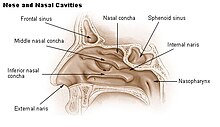| Rhinorrhea | |
|---|---|
| Other names | Rhinorrhoea (or rhinorrhœa) |
 | |
| Labeled cross section of the nasal cavities | |
| Specialty | Otorhinolaryngology |
Rhinorrhea (American English), also spelled rhinorrhoea or rhinorrhœa (British English), or informally runny nose is the free discharge of a thin mucus fluid from the nose;[1] it is a common condition. It is a common symptom of allergies (hay fever) or certain viral infections, such as the common cold or COVID-19. It can be a side effect of crying, exposure to cold temperatures, cocaine abuse,[2] or drug withdrawal, such as from methadone or other opioids.[3] Treatment for rhinorrhea may be aimed at reducing symptoms or treating underlying causes. Rhinorrhea usually resolves without intervention, but may require treatment by a doctor if symptoms last more than 10 days or if symptoms are the result of foreign bodies in the nose.[4]
The term rhinorrhea was coined in 1866 from the Greek rhino- ("of the nose") and -rhoia ("discharge" or "flow").[5]
- ^ Dorland's pocket medical dictionary. Elsevier. 10 November 2013. p. 660. ISBN 978-81-312-3501-0.
- ^ Myon L, Delforge A, Raoul G, Ferri J (February 2010). "[Palatal necrosis due to cocaine abuse]". Rev Stomatol Chir Maxillofac (in French). 111 (1): 32–5. doi:10.1016/j.stomax.2009.01.009. PMID 20060991.
- ^ Eileen Trigoboff; Kneisl, Carol Ren; Wilson, Holly Skodol (2004). Contemporary psychiatric-mental health nursing. Upper Saddle River, N.J: Pearson/Prentice Hall. p. 274. ISBN 978-0-13-041582-0.
- ^ "Rhinorrhea (Runny Nose)". Cleveland Clinic. Retrieved 10 October 2023.
- ^ "Rhinorrhea". Online Etymology Dictionary. Retrieved 21 September 2011.